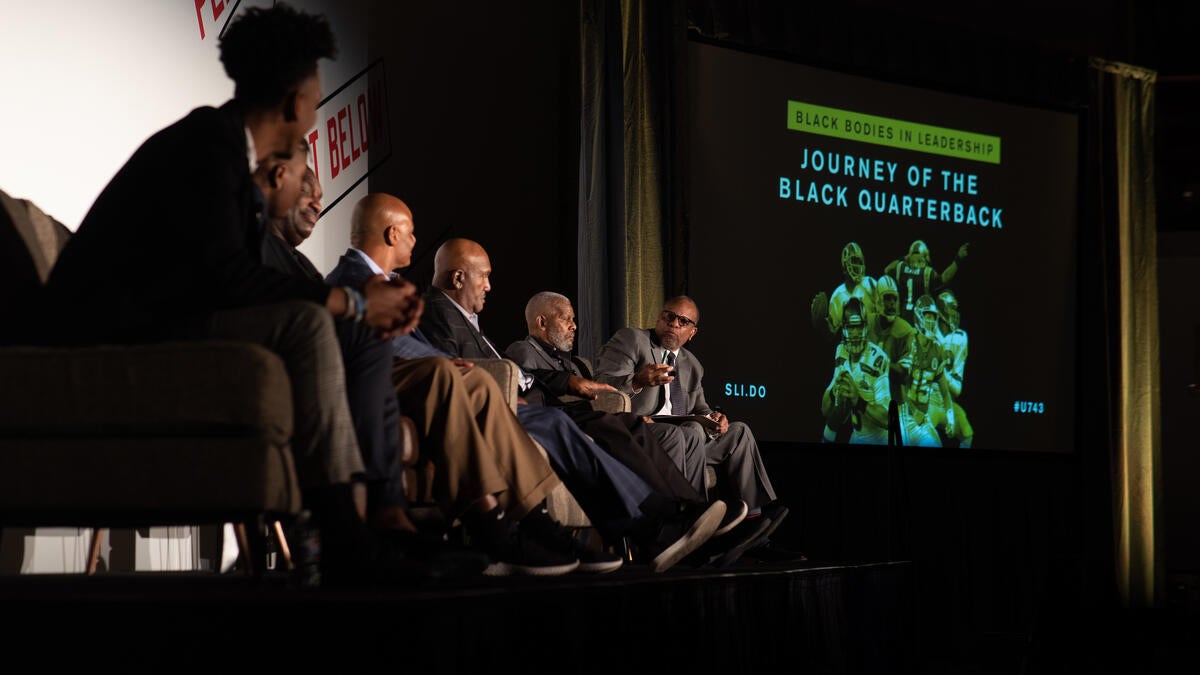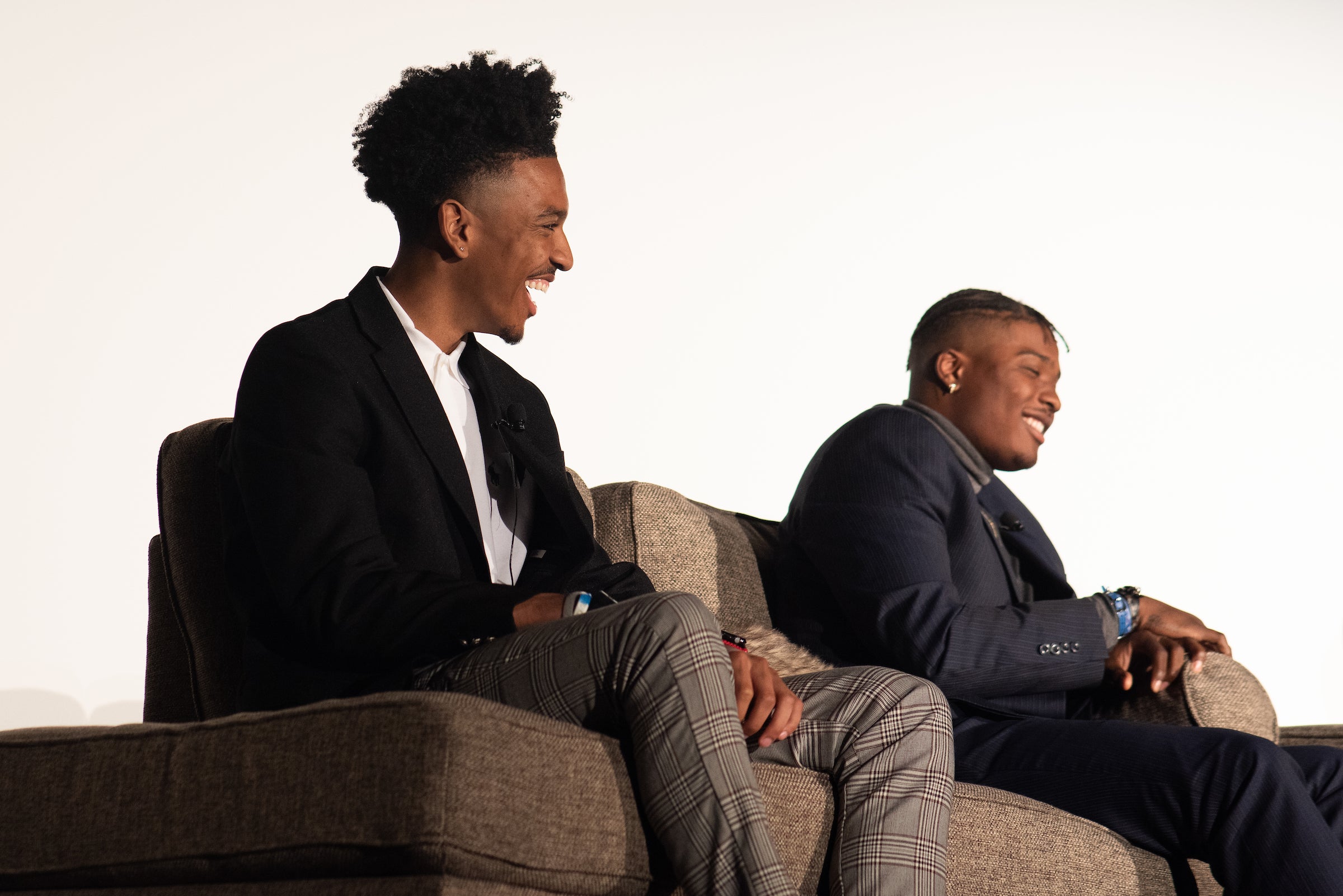Global Sport Institute celebrates groundbreaking black quarterbacks

Decades ago, young black men who were quarterbacks in high school knew that they would never get the chance to play that position in college or the professional leagues. They were “converted” — forced to play different positions.
“That was what happened back in the day,” said Ken Shropshire, CEO of the Global Sport Institute at Arizona State University, who played football at Stanford University in the 1970s. “We didn’t think anything of being converted.”
Shropshire spoke Thursday night at an event called “Black Bodies in Leadership: Journey of the Black Quarterback,” sponsored by the Global Sport Institute and held at the Phoenix Art Museum. Six black quarterbacks, including ASU quarterback Jayden Daniels, discussed their paths to becoming the most important players on their teams — and leaders in their communities.
That authority was the source of the discrimination they faced, according to Warren Moon, who played for 23 seasons in the NFL and was the first black quarterback elected to the Pro Football Hall of Fame.
“The position of quarterback did not scare me at all. If anything, it invigorated me, and that’s one of the reasons so many people have a problem with black people in the position,” he said.
“You have to be a leader not only on your team but in your community. You have the ability to make people follow your lead and a lot of people back in the day were afraid of African Americans having that power.”
Back then, coaches believed black players weren’t “smart enough” to play quarterback, said James “Shack” Harris, who was drafted by the Buffalo Bills in 1969.
“The reason blacks weren’t playing quarterback was because they said we weren’t smart enough, couldn’t lead and our character wasn’t right. On that ride to Buffalo, I decided that if I got cut, it wouldn’t be because I wasn’t smart enough, didn’t have the right character or couldn’t lead,” said Harris, who stayed in every night to study and prepare.
“I was happy to know that they kept me at quarterback realizing that I could do those things.”
Marlin Briscoe was the first black quarterback to start a professional game, with the Denver Broncos in 1968. He later won back-to-back Super Bowls with the Miami Dolphins.
“I knew it wasn’t going to be a level playing field. Racism was running rampant in 1968,” he said.
“But the more they did to me, the tougher I got. I wasn’t going to let them beat me. I kept working at it.”
Several of the former players chafed at the concept of a “black quarterback.”
“For me, it was never about color. I just enjoyed the play and being able to bring a group of 10 players together as a team to play for the same goal,” said Dwayne Haskins Jr., who just finished his rookie season with the Washington Redskins.
“To other people, I was a ‘black quarterback,’ and on top of that I don’t like to run, I like to throw. I woke up black. I just wanted to be a quarterback.”
Doug Williams, the first black quarterback to win a Super Bowl, in 1988, went to the historically black Grambling State University.
“When I got on campus, there were seven black quarterbacks. In 1978, I was drafted by Tampa Bay and I immediately became ‘Tampa Bay’s black quarterback’ and they used that my whole rookie year,” he said.
“It’s unfortunate that other people put the adjective on you and say what you can’t do, but you know what you can do and you get it done. There’s nothing like looking at the other guys’ faces and knowing that they’re following you.”
ASU quarterback Jayden Daniels (left) and Washington Redskins quarterback Dwayne Haskins Jr. speak at the "Black Bodies in Leadership: Journey of the Black Quarterback" panel Thursday night at the Phoenix Art Museum. Photo by Meg Potter/ASU Now
The players described some of the discrimination they faced. For Moon, it was painful to know that even though he was the most valuable player in the Rose Bowl, he wouldn’t be drafted as a quarterback in the NFL.
“If I went to camp and didn’t make it, fine. But to be told you weren’t going to get the opportunity was the thing that hurt the most,” said Moon, who played in Canada before joining the NFL in 1984.
As a player, he was forced to protect his family. When he was with the Houston Oilers, his 7-year-old son was crying as he came into the locker room after a loss.
“It had to do with everything he heard around him during the game, the names and the profanity that he had to listen to,” he said.
“That was a tough time for me. I dealt with it in college and knew what to expect but when you have to explain this to your young son, that was one of the toughest times because I had to switch off my quarterback hat and switch on my dad hat.”
Williams faced rampant racism during his time at Tampa Bay.
“I got a big package in the mail and it was wrapped really nice. No return address,” he said.
“I opened it. It had a watermelon in it. It said, ‘Throw this and they might be able to catch it.’”
Several of the players described how TV commentators would describe black quarterbacks as “athletic” and white quarterbacks as “smart.”
“The year we went to the playoffs in 1979, we lost three straight games,” Williams said. “Brent Musberger, on national TV, came out and said, ‘Doug Williams is killing the Buccaneers.’ I’ll never forget that. It’s still in my heart to this day.”
Before the quarterbacks’ panel, William Rhoden, former columnist for the New York Times, and Howard Bryant of ESPN and NPR discussed whether the NFL has finally turned a corner, with 10 black starting quarterbacks this past season, including Kyler Murray of the Arizona Cardinals and Patrick Mahomes of the Super Bowl-winning Kansas City Chiefs.
“This year it feels like it’s finally a major tipping point,” said Rhoden, who is a visiting senior practitioner with the Global Sport Institute and a visiting professor with the Walter Cronkite School of Journalism and Mass Communications at ASU.
“I always see the black quarterback as a metaphor for black male leadership not just in football but throughout the executive suite. It something we’ve been monitoring, and I’m very excited about the direction we seem to be heading.”
Bryant said the question is whether progress transcends the playing field and even the sport.
“There’s an unbelievable amount of pride. I remember in being in Philadelphia in college and watching Doug Williams in the Super Bowl and you just felt like this was something that was happening to you,” he said.
“But at the same time I always felt like one of the big differences was whether the sport was ever going to confront its racism and confront the reasons why we have to have these milestones.”
The game has changed to be so fast and sophisticated that the league knows it needs a diversity of players, he said.
“The question is, does that translate into the intellectual side of it as well and the leadership side of it? What does it actually mean for the position and the people playing it?”
The journalists also discussed activism and Colin Kaepernick, the former quarterback who went unclaimed in the NFL after he protested police killings of black people by kneeling during the national anthem.
“This generation is different and football is different from other sports,” said Bryant, author of the recently released “Full Dissidence: Notes from an Uneven Playing Field.” “Lebron James can be the face of black activism in an 80% black league.
“You would think you could have the same leadership from black quarterbacks in a 70% black league but the difference is that in football, there’s always been this tradition that the quarterback is an extension of management.”
The 19-year-old Daniels said that as a child, he was inspired by Kaepernick on the field, and later, by his activism.
“Growing up, I watched Kaep at Nevada when he beat Boise State, and as I got older I started to understand more of what’s happening in the world,” he said.
“I feel like he’s standing up for our rights and for minorities who are being taken advantage of. It’s something he stood for and he got a lot of respect from me because he knew what was right and what was wrong.”
The players also discussed the lack of black coaches in the NFL.
“It’s always a question of how smart are you are, no matter the generation because the guys coaching you don’t have the same color skin,” Haskins said.
“They expect you not to be smart, not to be able to run offense, not to be able to retain something, or be a good leader, and they think you have maturity or character issues. They don’t even get to know you, they just assume.”
Daniels said he appreciated having Herm Edwards and Marvin Lewis, the head coach and co-defensive coordinator, respectively, for the Sun Devils.
“I know they’ll have my back no matter what,” he said. “Most of the staff is black too, so just walking around the building, I see all these black men and knowing that I can talk to them about anything — not only football, but problems in the world — is a great feeling.”
Top image: William Rhoden, Global Sport Institute visiting senior practitioner (at far right), moderates the panel of current and former players at "Black Bodies in Leadership: Journey of the Black Quarterback" at the Phoenix Art Museum on Thursday night. From left, the quarterbacks are: Jayden Daniels, current quarterback at ASU; Dwayne Haskins Jr., quarterback for the Washington Redskins; and former quarterbacks Doug Williams, Warren Moon, James "Shack" Harris and Marlin Briscoe. Photo by Meg Potter/ASU Now
